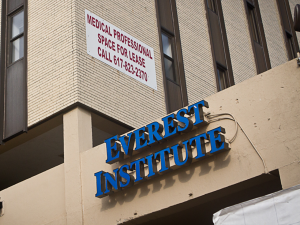Explaining Florida’s For-Profit College Industry

Kirk Carapezza / WGBH
Corinthian Colleges, the parent company of Everest University, agreed to sell or close all its campuses. This campus in Boston has closed. Florida campuses were sold.
Miami Herald reporter Michael Vasquez has spent a year digging into Florida’s for-profit college industry for a series called Higher Ed Hustle.
About 300,000 Florida students attend a for-profit college, which often specialize in training low-skill workers for a new career.
But students often find their degree doesn’t qualify for the career they were seeking, and they graduate withe tens of thousands of dollars in debt.
Vasquez spoke with StateImpact Florida about what he discovered:
Q: Michael, you have spent a year looking at how for-profit colleges, career colleges, operate in Florida. Why don’t you kind of sum up what you’ve found?
A: Sometimes career colleges, which are mostly for-profit, sometimes they do a good job with students. They take students who are typically non-traditional older students. Maybe, if they’re younger, they probably weren’t the best students in high school.
And some of these for-profit institutions do a good job. They give them the hand-holding that these students need to graduate and ultimately get jobs.
But there are substantial numbers of schools out there that have practices that are, frankly, just shocking.
Q: One of the things you found, is that you spoke with a student named Sara Pierce. And Sara was studying to be certified as a nutritionist. When she got the end of her program she found out, oh, Kaplan University’s degrees aren’t qualified to take this national nutritionists test. She found out, basically, her degree was worthless.
Is this common? How often does this happen?
A: It’s frighteningly common. If it’s not accredited, you’re basically out of luck in about 30 or 35 states. The complaint that comes up over and over and over again is that there are certain things that are buried in the fine print of these contracts that, legally speaking, the schools say ‘We have disclosed to student X or student Y that this program doesn’t lead to licensure, it doesn’t lead to this or that.’
The problem is what they are putting in writing and what they are telling students during the sign-up process is often extraordinarily different.
Q: As Sara Pierce says, she never would have done this if she had known.
Pierce: “Yeah, I never would have came here. I never would have done this if I knew I wasn’t going to get anywhere. Why would I? And I did. I put three hard years into this. And I can’t get that back.”
The bottom line for her is: She’s still working at a restaurant as she was before she went to Kaplan University and she’s now tens of thousands of dollars in debt. Is that right?
A: That’s correct. She’s, I want to say, about $52,000 in debt specifically from Kaplan. About the only thing that’s changed is she’s working at a different restaurant.
Q: You spoke with a former recruiter for Everest University named Vince Martin and what he told you is the schools’ philosophy was to quote “mine the pain.”
Martin: “If somebody says ‘Oh, God, I’ve been looking for a job for 18 months.’ Oh, can you tell me a little bit more about that? And, now we’re starting to mine the pain. But that’s a very broad level. We’re not, really, getting down to twisting the knife in at this point.”
One of the things schools do is to find people who are desperate for change and then sell them hope. Is that accurate?
A: That’s completely accurate. These really are the people at the bottom rungs of society.
And going back to school and getting an education and, hopefully, a new career and a new life, this is their one golden ticket to use the Willy Wonka analogy.
When the government gives you Pell Grants – people think that Pell Grants are free money, and they are to a certain extent if you’re low-income. But there’s a limit. You’re only going to get Pell Grants for a certain number of semesters.
You only get one shot at this. And if it doesn’t work out – and it frequently does not work out in many of the cases we identified – there’s no second chance.
Q: Just how dependent on federal financial aid are these for-profit and career colleges?
A: Simply put, without you and me and every other taxpayer, many, many of these schools would not exist.
They oftentimes get about 80 or 90 – up to 90 percent of their money comes from taxpayer-funded federal financial aid. It is way too easy to enroll in a school and have Uncle Sam pay the bill, or at least part of the bill, and you’ll deal with the loans later on.
Simply put, you should not be able to make this decision in two hours and people are making this decision in two hours all the time. And never realizing until it’s too late what they’ve truly done.
